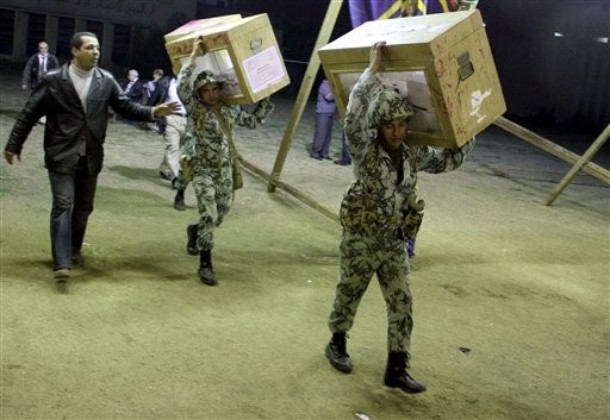
Port Said — The young Egyptian judge reopening his polling station shortly before 8 this morning took great trouble not only to carry out procedures correctly but to be seen doing so. He looked frankly relieved to see international observers present, but would not open the door until at least one party agent was there to witness; as luck would have it, an agent of the Freedom and Justice Party (FJP) was close by. The judge undid the padlocks and broke the seals—strips of cloth fastened with blobs of red wax—on the classroom door, over the slots in ballot boxes left in the room overnight, on packages of unused ballots. After a quick sweeping of the room, which was littered with campaign materials from the previous day, the voting began again. Just outside the school, an FJP representative had set up a table with large poster.
In watching voters coming and going, sometimes it seemed clear which neighborhoods were Salafi strongholds due to the prevalence of men with short cropped hair and long, bushy beards, as well as women swathed in black, complete with face veils and gloves. The Brotherhood men, on the other hand, often cultivate a more Western appearance, with neatly-trimmed beards (or just mustaches) and business suits, while the women always cover their heads but not often their faces. Akram al-Shaer, the FJP’s candidate for an individual seat and probably the most prominent Brotherhood politician in Port Said, visited a polling station in the al-Manakh neighborhood, which struck me as having a heavy Salafi presence, while I was there this morning. Those in attendance returned his cheery greeting with respect but without enthusiasm; his visit created no ripple of excitement in a room full of poll workers and voters.
But two villages I visited just south of Port Said—which border the Suez Canal and are part of the Port Said electoral district—were clearly Brotherhood territory. In one village, Akram al-Shaer’s name and the slogan “Islam is the solution” were stenciled artfully on the exterior walls of house after house, although such religious slogans are legally banned in campaigns and are absent from the FJP’s campaign posters and other official materials. As I was leaving a polling station in the village, an FJP representative confronted me over this fact, having noticed that I jotted al-Islam huwa al-hal (Islam is the solution) in my notebook. Apparently fearing that this was the sort of thing that international observers write in their reports (actually the official monitoring involves keeping track of more technical things, such as whether ballot boxes were locked and whether voting was taking place in private or in public), he vowed to contest any such finding.
Nosy international observers apparently were also starting to get on the nerve of some other Egyptians involved in the elections by the end of a second tiring day at the polls. While we were observing the 7 pm closing procedures at another polling place inside Port Said, an army officer entered the room and the previously-friendly supervising judge suddenly said it was time for us to go. As we waited outside to watch the ballot boxes being loaded into a red pickup truck for transportation to the counting center, the army officer approached us and asked for our evaluation of the elections. When we replied (per observer instructions) that we were not permitted to give our opinions, he replied with evident exasperation: “My men and I have worked very hard to give the Egyptian people the sort of free electoral process they have never experienced before; I hope you can appreciate that.”
We were all as exhausted as that army officer by the time vote counting began at a sports arena, some 12 hours after the polls opened. But this was not a scene to be missed. A military band played outside Mubarak Hall—at least that is what it used to be called until the name was removed from the front after the revolution—while hundreds of candidates, representatives, and their family members jostled each other, trying to get in past reasonably tight security. The floor of the enormous hall was lined with long tables and folding chairs, which could barely accommodate the more than 500 voting boxes. The poll supervisor and staff from each station opened and unpacked their own boxes (I recognized the team from the station I had visited just an hour earlier), while hundreds of candidates, their representatives, and civil society monitors observed from the bleachers above.
The audience periodically erupted into jeers, demands, cheers, or chants, almost as though it were indeed a sport taking place, using their collective vocal power to force a response from the floor below. When one group of poll workers dumped the contents of a ballot box onto a table instead of unpacking it sheet by sheet, the crowd erupted into angry shouts. When a hapless clerk used a pen to tick off ballots she had checked for completeness, dozens chanted alam! (pen) and pointed at her until she got the clue. The biggest response I saw was when the man of the hour—yes, Akram al-Shaer—stepped down from the bleachers and began to wander around the vote-counting floor—very much out of order for a candidate–provoking furious calls for security intervention and chants of itla’! (get up) until he complied.
Al-Shaer’s individual seat race with George Ishak is expected to be announced as soon as tomorrow, but it will be weeks before the Port Saidis know which lists won the district’s four proportional seats. Until then, the army, police, and printing presses of the city can take a bit of a break, while the weary judges move on to the runoffs and the next round of parliamentary elections on December 14.
Michele Dunne is the director of the Rafik Hariri Center for the Middle East and an official observer of the first stage of the parliamentary elections. She can be reached at mdunne@acus.org.
Photo Credit: Associated Press
Image: 610x_52.jpg
